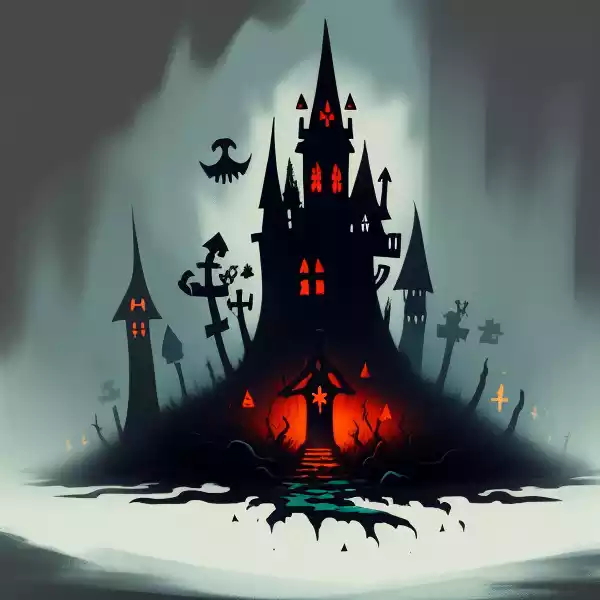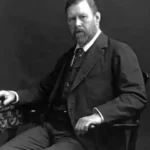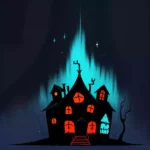 | |
Buried Treasures | |
| Author | Bram Stoker |
|---|---|
| Published |
1875
|
| Language | English |
| Nationality | Irish |
| Genre | Gothic Fiction, Horror |
1875 Short Story
Buried Treasures
Buried Treasures is an English Gothic Fiction, Horror short story by Irish writer Bram Stoker. It was first published in 1875.
Buried Treasures
by Bram Stoker
Chapter I – The Old Wreck
Mr. Stedman spoke.
“I do not wish to be too hard on you; but I will not, I cannot consent to Ellen’s marrying you till you have sufficient means to keep her in comfort. I know too well what poverty is. I saw her poor mother droop and pine away till she died, and all from poverty. No, no, Ellen must be spared that sorrow at all events.”
“But, sir, we are young. You say you have always earned your living. I can do the same and I thought” – this with a flush – “I thought that if I might be so happy as to win Ellen’s love that you might help us.”
“And so I would, my dear boy; but what help could I give? I find it hard to keep the pot boiling as it is, and there is only Ellen and myself to feed. No, no, I must have some certainty for Ellen before I let her leave me. Just suppose anything should happen to me” –
“Then, sir, what could be better than to have some one to look after Ellen – some one with a heart to love her as she should be loved, and a pair of hands to be worked to the bone for her sake.”
“True, boy; true. But still it cannot be. I must be certain of Ellen’s future before I trust her out of my own care. Come now, let me see you with a hundred pounds of your own, and I shall not refuse to let you speak to her. But mind, I shall trust to your honour not to forestall that time.”
“It is cruel, sir, although you mean it in kindness. I could as easily learn to fly as raise a hundred pounds with my present opportunities. Just think of my circumstances, sir. If my poor father had lived all would have been different; but you know that sad story.”
“No, I do not. Tell it to me.”
“He left the Gold Coast after spending half his life there toiling for my poor mother and me. We knew from his letter that he was about to start for home, and that he was coming in a small sailing vessel, taking all his savings with him. But from that time to this he has never been heard of.”
“Did you make inquiries?”
“We tried every means, or rather poor mother did, for I was too young, and we could find out nothing.”
“Poor boy. From my heart I pity you; still I cannot change my opinion. I have always hoped that Ellen would marry happily. I have worked for her, early and late, since she was born, and it would be mistaken kindness to let her marry without sufficient provisions for her welfare.”
Robert Hamilton left Mr. Stedman’s cottage in great dejection. He had entered it with much misgiving, but with a hope so strong that it brightened the prospect of success. He went slowly along the streets till he got to his office, and when once there he had so much work to do that little time was left him for reflection until his work for the day was over. That night he lay awake, trying with all the intentness of his nature to conceive some plan by which he might make the necessary sum to entitle him to seek the hand of Ellen Stedman: but all in vain. Scheme after scheme rose up before him, but each one, though born of hope, quickly perished in succession. Gradually his imagination grew in force as the real world seemed to fade away; he built bright castles in the air and installed Ellen as their queen. He thought of all the vast sums of money made each year by chances, of old treasures found after centuries, new treasures dug from mines, and turned from mills and commerce. But all these required capital – except the old treasures – and this source of wealth being a possibility, to it his thoughts clung as a man lost in mid-ocean clings to a spar – clung as he often conceived that his poor father had clung when lost with all his treasure far at sea.
“Vigo Bay, the Schelde, already giving up their long-buried spoil,” so thought he. “All round our coasts lie millions lost, hidden but for a time. Other men have benefited by them – why should not I have a chance also?” And then, as he sunk to sleep the possibility seemed to become reality, and as he slept he found treasure after treasure, and all was real to him, for he knew not that he dreamt.
He had many dreams. Most of them connected with the finding of treasures, and in all of them Ellen took a prominent place. He seemed in his dreams to renew his first acquaintance with the girl he loved, and when he thought of the accident that brought them together, it might be expected that the seashore was the scene of many of his dreams. The meeting was in this wise: One holiday, some three years before, he had been walking on the flat shore of the ‘Bull,’ when he noticed at some distance off a very beautiful young girl, and set to longing for some means of making her acquaintance. The means came even as he wished. The wind was blowing freely, and the girl’s hat blew off and hurried seawards over the flat shore. He ran after it and brought it back: and from that hour the two had, after their casual acquaintance had been sanctioned by her father, became fast friends.
Most of his dreams of the night had faded against morning, but one he remembered.
He seemed to be in a wide stretch of sand near the hulk of a great vessel. Beside him lay a large iron-bound box of great weight, which he tried in vain to lift. He had by a lever just forced it through a hole in the side of the ship, and it had fallen on the sand and was sinking. Despite all he could do, it still continued to go down into the sand, but by slow degrees. The mist was getting round him, shutting out the moonlight, and from far he could hear a dull echoing roar muffled by the fog, and the air seemed laden with the clang of distant bells. Then the air became instinct with the forms of life, and amid them floated the form of Ellen, and with her presence the gloom and fog and darkness were dispelled, and the sun rose brightly on the instant, and all was fair and happy.
Next day was Sunday, and so after prayers he went for a walk with his friend, Tom Harrison.
They directed their steps towards Dollymount, and passing across the bridge, over Crab Lake, found themselves on the North Bull. The tide was “black” out, and when they crossed the line of low bent-covered sand-hills, or dunnes, as they are called in Holland, a wide stretch of sand intersected with shallow tidal streams lay before them, out towards the mouth of the bay. As they looked, Robert’s dream of the night before flashed into his memory, and he expected to see before him the hulk of the old ship.
Presently Tom remarked:
“I do not think I ever saw the tide so far out before. What an immense stretch of sand there is. It is a wonder there is no rock or anything of the kind all along this shore.”
“There is one,” said Robert, pointing to where, on the very edge of the water, rose a little mound, seemingly a couple of feet at most, over the level of the sand.
“Let us go out to it,” said Tom, and accordingly they both took off their boots and stockings, and walked over the wet sand, and forded the shallow streams till they got within a hundred yards of the mound. Suddenly Tom called out: “It is not a rock at all; it is a ship, bottom upwards, with the end towards us, and sunk in the sand.”
Robert’s heart stood still for an instant.
What if this should be a treasure-ship, and his dream prove prophetic? In an instant more he shook aside the fancy and hurried on.
They found that Tom had not been mistaken. There lay the hulk of an old ship, with just its bottom over the sand. Close round it the ebb and flow of the tide had worn a hole like the moat round an old castle; and in this pool small fishes darted about, and lazy crabs sidled into the sand.
Tom jumped the narrow moat, and stood balanced on the keel, and a hard task he had to keep his footing on the slippery seaweed. He tapped the timbers with his stick, and they gave back a hollow sound. “The inside is not yet choked up,” he remarked.
Robert joined him, and walked all over the bottom of the ship, noticing how some of the planks, half rotten with long exposure, were sinking inwards.
After a few minutes Tom spoke –
“I say, Bob, suppose that this old ship was full of money, and that you and I could get it out.”
“I have just been thinking the same.”
“Suppose we try,” said Tom, and he commenced to endeavour to prize up the end of a broken timber with his stick. Robert watched him for some minutes, and when he had given up the attempt in despair, spoke –
“Suppose we do try, Tom. I have a very strange idea. I had a curious dream last night, and this old ship reminds me of it.”
Tom asked Robert to tell the dream. He did so, and when he had finished, and had also confided his difficulty about the hundred pounds, Tom remarked –
“We’ll try the hulk, at any rate. Let us come some night and cut a hole in her and look. It might be worth our while; it will be a lark at any rate.”
He seemed so interested in the matter that Robert asked him the reason.
“Well, I will tell you,” he said. “You know Tomlinson. Well, he told me the other day that he was going to ask Miss Stedman to marry him. He is well off – comparatively, and unless you get your chance soon you may be too late. Don’t be offended at me for telling you. I wanted to get an opportunity.”
“Thanks, old boy,” was Robert’s answer, as he squeezed his hand. No more was spoken for a time. Both men examined the hulk carefully, and then came away, and sat again on a sand hill.
Presently a coastguard came along, with his telescope under his arm. Tom entered into conversation with him about the wreck.
“Well, sir,” he said, “that was afore my time here. I’ve been here only about a year, and that’s there a matter o’ fifteen year or thereabouts. She came ashore here in the great storm when the ‘Mallard’ was lost in the Scillies. I’ve heerd tell” –
Robert interrupted him to ask –
“Did anyone ever try what was in her?”
“Well, sir, there I’m out. By rights there should, but I’ve bin told that about then there was a lawsuit on as to who the shore belonged to. The ship lay in the line between the Ballast Board ground and the Manor ground, or whatever it is, and so nothin’ could be done till the suit was ended, and when it was there weren’t much use lookin’ for anything, for she was settled nigh as low as she is now, and if there ever was anything worth havin’ in her the salt water had ruined it long ago.”
“Then she was never examined?” said Tom.
“Most like not, sir; they don’t never examine little ships like her – if she was a big one we might,” and the coastguard departed.
When he was gone Tom said, “By Jove, he forgot to say on whose ground she is,” and he ran after him to ask the question. When he came back he said, “It’s all right; it belongs to Sir Arthur Forres.”
After watching for some time in silence Robert said, “Tom, I have very strange thoughts about this. Let us get leave from Sir Arthur – he is, I believe, a very generous man – and regularly explore.”
“Done,” said Tom, and, it being now late, they returned to town.
Chapter II – Wind and Tide
Robert and Tom next day wrote a letter to Sir Arthur Forres asking him to let them explore the ship, and by return of post got a kind answer, not only granting the required permission, but making over the whole ship to them to do what they pleased with. Accordingly they held a consultation as to the best means of proceeding, and agreed to commence operations as soon as possible, as it was now well on in December, and every advance of winter would throw new obstacles in their way. Next day they bought some tools, and brought them home in great glee. It often occurred to both of them that they were setting out on the wildest of wild-goose chases, but the novelty and excitement of the whole affair always overcame their scruples. The first moonlight night that came they took their tools, and sallied out to Dollymount to make the first effort on their treasure ship. So intent were they on their object that their immediate surroundings did not excite their attention. It was not, therefore, till they arrived at the summit of the sand hill, from which they had first seen the hulk, that they discovered that the tide was coming in, and had advanced about half way. The knowledge was like a cold bath to each of them, for here were all their hopes dashed to the ground, for an indefinite time at least. It might be far into the winter time – perhaps months – before they could get a union of tide, moonlight, and fair weather, such as alone could make their scheme practicable. They had already tried to get leave from office, but so great was the press of business that their employer told them that unless they had special business, which they could name, he could not dispense with their services. To name their object would be to excite ridicule, and as the whole affair was but based on a chimera they were of course silent.
They went home sadder than they had left it, and next day, by a careful study of the almanac, made out a list of the nights which might suit their purpose – if moon and weather proved favourable. From the fact of their living in their employer’s house their time was further curtailed, for it was an inflexible rule that by twelve o’clock everyone should be home. Therefore, the only nights which could suit were those from the 11th to the 15th December, on which there would be low water between the hours of seven and eleven. This would give them on each night about one hour in which to work, for that length of time only was the wreck exposed between the ebbing and flowing tides.
They waited in anxiety for the 11th December, the weather continued beautifully fine, and nearly every night the two friends walked to view the scene of their future operations. Robert was debarred from visiting Ellen by her father’s direction, and so was glad to have some object of interest to occupy his thoughts whilst away from her.
As the time wore on, the weather began to change, and Robert and Tom grew anxious. The wind began to blow in short sharp gusts, which whirled the sodden dead leaves angrily about exposed corners, and on the seaboard sent the waves shorewards topped with angry crests. Misty clouds came drifting hurriedly over the sea, and at times the fog became so thick that it was hardly possible to see more than a few yards ahead, still the young men continued to visit their treasure every night. At first, the coastguards had a watchful eye on them, noticing which they unfolded their purpose and showed Sir Arthur’s letter making the ship over to their hands.
The sailors treated the whole affair as a good joke, but still promised to do what they could to help them, in the good-humoured way which is their special charm. A certain fear had for some time haunted the two friends – a fear which neither of them had ever spoken out. From brooding so much as they did on their adventure, they came to think, or rather to feel, that the ship which for fifteen years had been unnoticed and untouched in the sand, had suddenly acquired as great an interest in the eyes of all the world as of themselves. Accordingly, they thought that some evil-designing person might try to cut them out of their adventure by forestalling them in searching the wreck. Their fear was dispelled by the kindly promise of the coastguards not to let anyone meddle with the vessel without their permission. As the weather continued to get more and more broken, the very disappointment of their hopes, which the break threatened served to enlarge those hopes, and when on the night of the tenth they heard a wild storm howling round the chimneys, as they lay in bed, each was assured in his secret heart that the old wreck contained such a treasure as the world had seldom seen.
Seven o’clock next night saw them on the shore of the Bull looking out into the pitchy darkness. The wind was blowing so strongly inshore that the waves were driven high beyond their accustomed line at the same state of the tide, and the channels were running like mill-dams. As each wave came down over the flat shore it was broke up into a mass of foam and spray, and the wind swept away the spume until on shore it fell like rain. Far along the sandy shore was heard the roaring of the waves, hoarsely bellowing, so that hearing the sound we could well imagine how the district got its quaint name.
On such a night it would have been impossible to have worked at the wreck, even could the treasure-seekers have reached it, or could they have even found it in the pitchy darkness. They waited some time, but seeing that it was in vain, they sadly departed homeward, hoping fondly that the next evening would prove more propitious.
Vain were their hopes. The storm continued for two whole days, for not one moment of which, except between the pauses of the rushing or receding waves, was the wreck exposed. Seven o’clock each night saw the two young men looking over the sand-hills, waiting in the vain hope of a chance of visiting the vessel, hoping against hope that a sudden calm would give the opportunity they wished. When the storm began to abate their hopes were proportionally raised, and on the morning of the 14th when they awoke and could not hear the wind whistling through the chimneys next their attic, they grew again sanguine of success. That night they went to the Bull in hope, and came home filled with despair. Although the storm had ceased, the sea was still rough. Great, heavy, sullen waves, sprayless, but crested ominously, from ridges of foam, came rolling into the bay, swelling onward with great speed and resistless force, and bursting over the shallow waste of sand so violently that even any attempt to reach the wreck was out of the question. As Robert and Tom hurried homeward – they had waited to the latest moment on the Bull, and feared being late – they felt spiritless and dejected. But one more evening remained on which they might possibly visit the wreck, and they feared that even should wind and tide be suitable one hour would not do to explore it. However, youth is never without hope, and next morning they both had that sanguine feeling which is the outcome of despair – the feeling that the tide of fortune must sometime turn, and that the loser as well as the winner has his time. As they neared the Bull that night their hearts beat so loud that they could almost hear them. They felt that there was ground for hope. All the way from town they could see the great flats opposite Clontarf lying black in the moonlight, and they thought that over the sands the same calm must surely rest. But, alas, they did not allow for the fact that two great breakwaters protect the harbour, but that the sands of the Bull are open to all the storms that blow – that the great Atlantic billows, broken up on the northern and southern coasts, yet still strong enough to be feared, sweep up and down the Channel, and beat with every tide into the harbours and bays along the coast. Accordingly, on reaching the sand-hills, they saw what dashed their hopes at once.
The moon rose straight before them beyond the Bailey Lighthouse, and the broad belt of light which stretched from it passed over the treasure-ship. The waves, now black, save where the light caught the sloping sides, lay blank, but ever and anon as they passed on far over their usual range, the black hull rose among the gleams of light. There was not a chance that the wreck could be attempted, and so they went sadly home – remembering the fact that the night of the 24th December was the earliest time at which they could again renew their effort.
Chapter III – The Iron Chest
The days that intervened were long to both men.
To Robert they were endless; even the nepenthe of continued hard work could not quiet his mind. Distracted on one side by his forbidden love for Ellen, and on the other by the expected fortune by which he might win her, he could hardly sleep at night. When he did sleep he always dreamed, and in his dreams Ellen and the wreck were always associated. At one time his dream would be of unqualified good fortune – a vast treasure found and shared with his love; at another, all would be gloom, and in the search for the treasure he would endanger his life, or, what was far greater pain, forfeit her love.
However, it is one consolation, that, whatever else may happen in the world, time wears on without ceasing, and the day longest expected comes at last.
On the evening of the 24th December, Tom and Robert took their way to Dollymount in breathless excitement.
As they passed through town, and saw the vast concourse of people all intent on one common object – the preparation for the greatest of all Christian festivals – the greatest festival, which is kept all over the world, wherever the True Light has fallen, they could not but feel a certain regret that they, too, could not join in the throng. Robert’s temper was somewhat ruffled by seeing Ellen leaning on the arm of Tomlinson, looking into a brilliantly-lighted shop window, so intently, that she did not notice him passing. When they had left the town, and the crowds, and the overflowing stalls, and brilliant holly-decked shops, they did not so much mind, but hurried on.
So long as they were within city bounds, and even whilst there were brightly-lit shop windows, all seemed light enough. When, however, they were so far from town as to lose the glamour of the lamplight in the sky overhead, they began to fear that the night would indeed be too dark for work.
They were prepared for such an emergency, and when they stood on the slope of sand, below the dunnes, they lit a dark lantern and prepared to cross the sands. After a few moments they found that the lantern was a mistake. They saw the ground immediately before them so far as the sharp triangle of light, whose apex was the bulls-eye, extended, but beyond this the darkness rose like a solid black wall. They closed the lantern, but this was even worse, for after leaving the light, small though it was, their eyes were useless in the complete darkness. It took them nearly an hour to reach the wreck.
At last they got to work, and with hammer and chisel and saw commenced to open the treasure ship.
The want of light told sorely against them, and their work progressed slowly despite their exertions. All things have an end, however, and in time they had removed several planks so as to form a hole some four feet wide, by six long – one of the timbers crossed this; but as it was not in the middle, and left a hole large enough to descend by, it did not matter.
It was with beating hearts that the two young men slanted the lantern so as to turn the light in through the aperture. All within was black, and not four feet below them was a calm glassy pool of water that seemed like ink. Even as they looked this began slowly to rise, and they saw that the tide had turned, and that but a few minutes more remained. They reached down as far as they could, plunging their arms up to their shoulders in the water, but could find nothing. Robert stood up and began to undress.
“What are you going to do?” said Tom.
“Going to dive – it is the only chance we have.”
Tom did not hinder him, but got the piece of rope they had brought with them and fastened it under Robert’s shoulders and grasped the other end firmly. Robert arranged the lamp so as to throw the light as much downwards as possible, and then, with a silent prayer, let himself down through the aperture and hung on by the beam. The water was deadly cold – so cold, that, despite the fever heat to which he was brought through excitement, he felt chilled. Nevertheless he did not hesitate, but, letting go the beam, dropped into the black water.
“For Ellen,” he said, as he disappeared.
In a quarter of a minute he appeared again, gasping, and with a convulsive effort climbed the short rope, and stood beside his friend.
“Well?” asked Tom, excitedly.
“Oh-h-h-h! good heavens, I am chilled to the heart. I went down about six feet, and then touched a hard substance. I felt round it, and so far as I can tell it is a barrel. Next to it was a square corner of a box, and further still something square made of iron.”
“How do you know it is iron?”
“By the rust. Hold the rope again, there is no time to lose; the tide is rising every minute, and we will soon have to go.”
Again he went into the black water and this time stayed longer. Tom began to be frightened at the delay, and shook the rope for him to ascend. The instant after he appeared with face almost black with suffused blood. Tom hauled at the rope, and once more he stood on the bottom of the vessel. This time he did not complain of the cold. He seemed quivering with a great excitement that overcame the cold. When he had recovered his breath he almost shouted out –
“There’s something there. I know it – I feel it.”
“Anything strange?” asked Tom, in fierce excitement.
“Yes, the iron box is heavy – so heavy that I could not stir it. I could easily lift the end of the cask, and two or three other boxes, but I could not stir it.”
Whilst he was speaking, both heard a queer kind of hissing noise, and looking down in alarm saw the water running into the pool around the vessel. A few minutes more and they would be cut off from shore by some of the tidal streams. Tom cried out:
“Quick, quick! or we shall be late. We must put down the beams before the tide rises or it will wash the hold full of sand.”
Without waiting even to dress, Robert assisted him and they placed the planks on their original position and secured them with a few strong nails. Then they rushed away for shore. When they had reached the sand-hill, Robert, despite his exertions, was so chilled that he was unable to put on his clothes.
To bathe and stay naked for half an hour on a December night is no joke.
Tom drew his clothes on him as well as he could, and after adding his overcoat and giving him a pull from the flask, he was something better. They hurried away, and what with exercise, excitement, and hope were glowing when they reached home.
Before going to bed they held a consultation as to what was best to be done. Both wished to renew their attempt as they could begin at half-past seven o’clock; for although the morrow was Christmas Day, they knew that any attempt to rescue goods from the wreck should be made at once. There were now two dangers to be avoided – rough weather and the drifting of the sand – and so they decided that not a moment was to be lost.
At the daybreak they were up, and the first moment that saw the wreck approachable found them wading out towards it. This time they were prepared for wet and cold. They had left their clothes on the beach and put on old ones, which, even if wet, would still keep off the wind, for a strong, fitful breeze was now blowing in eddies, and the waves were beginning to rise ominously. With beating hearts they examined the closed-up gap; and, as they looked, their hopes fell. One of the timbers had been lifted off by the tide, and from the deposit of sand in the crevices, they feared that much must have found its way in. They had brought several strong pieces of rope with them, for their effort to-day was to be to lift out the iron chest, which both fancied contained a treasure.
Robert prepared himself to descend again. He tied one rope round his waist, as before, and took the other in his hands. Tom waited breathlessly till he returned. He was a long time coming up, and rose with his teeth chattering, but had the rope no longer with him. He told Tom that he had succeeded in putting it under the chest. Then he went down again with the other rope, and when he rose the second time, said that he had put it under also, but crossing the first. He was so chilled that he was unable to go down a third time. Indeed, he was hardly able to stand so cold did he seem; and it was with much shrinking of spirit that his friend prepared to descend to make the ropes fast, for he knew that should anything happen to him Robert could not help him up. This did not lighten his task or serve to cheer his spirits as he went down for the first time into the black water. He took two pieces of rope; his intention being to tie Robert’s ropes round the chest, and then bring the spare ends up. When he rose he told Robert that he had tied one of the ropes round the box, but had not time to tie the others. He was so chilled that he could not venture to go down again, and so both men hurriedly closed the gap as well as they could, and went on shore to change their clothes. When they had dressed, and got tolerably warm, the tide had begun to turn, and so they went home, longing for the evening to come, when they might make the final effort.
Chapter IV – Lost and Found
Tom was to dine with some relatives where he was living. When he was leaving Robert he said to him, “Well, Bob, seven o’clock, sharp.”
“Tom, do not forget or be late. Mind, I trust you.”
“Never fear, old boy. Nothing short of death shall keep me away; but if I should happen not to turn up do not wait for me. I will be with you in spirit if I cannot be in the flesh.”
“Tom, don’t talk that way. I don’t know what I should do if you didn’t come. It may be all a phantom we’re after, but I do not like to think so. It seems so much to me.”
“All right, old man,” said Tom, cheerily, “I shan’t fail – seven o’clock,” and he was gone.
Robert was in a fever all day. He went to the church where he knew he would see Ellen, and get a smile from her in passing. He did get a smile, and a glance from her lovely dark eyes which said as plainly as if she had spoken the words with her sweet lips, “How long you have been away; you never come to see me now.” This set Robert’s heart bounding, but it increased his fever. “How would it be,” he thought, “if the wreck turned out a failure, and the iron box a deception? If I cannot get £100 those dark eyes will have to look sweet things to some other man; that beautiful mouth to whisper in the ears of some one who would not – could not – love her half so well as I do.”
He could not bear to meet her, so when service was over he hurried away. When she came out her eyes were beaming, for she expected to see Robert waiting for her. She looked anxiously, but could only see Mr. Tomlinson, who did not rise in her favour for appearing just then.
Robert had to force himself to eat his dinner. Every morsel almost choked him, but he knew that strength was necessary for his undertaking, and so compelled himself to eat. As the hour of seven approached he began to get fidgety. He went often to the window, but could see no sign of Tom. Seven o’clock struck, but no Tom came. He began to be alarmed. Tom’s words seemed to ring in his ears, “nothing short of death shall keep me away.” He waited a little while in terrible anxiety, but then bethought him of his companion’s other words, “if I should not happen to turn up do not wait for me,” and knowing that whether he waited or no the tide would still come in all the same, and his chance of getting out the box would pass away, determined to set out alone. His determination was strengthened by the fact that the gusty wind of the morning had much increased, and sometimes swept along laden with heavy clinging mist that bespoke a great fog bank somewhere behind the wind.
Till he had reached the very shore of the “Bull” he did not give up hopes of Tom, for he thought it just possible that he might have been delayed, and instead of increasing the delay by going home, had come on straight to the scene of operation.
There was, however, no help for it; as Tom had not come he should work alone. With misgivings he prepared himself. He left his clothes on the top of a sand-hill, put on the old ones he had brought with him, took his tools, ropes, and lantern, and set out. There was cause for alarm. The wind was rising, and it whistled in his ears as the gusts swept past. Far away in the darkness the sea was beginning to roar on the edge of the flats, and the mist came driving inland in sheets like the spume from a cataract. The water in the tidal







